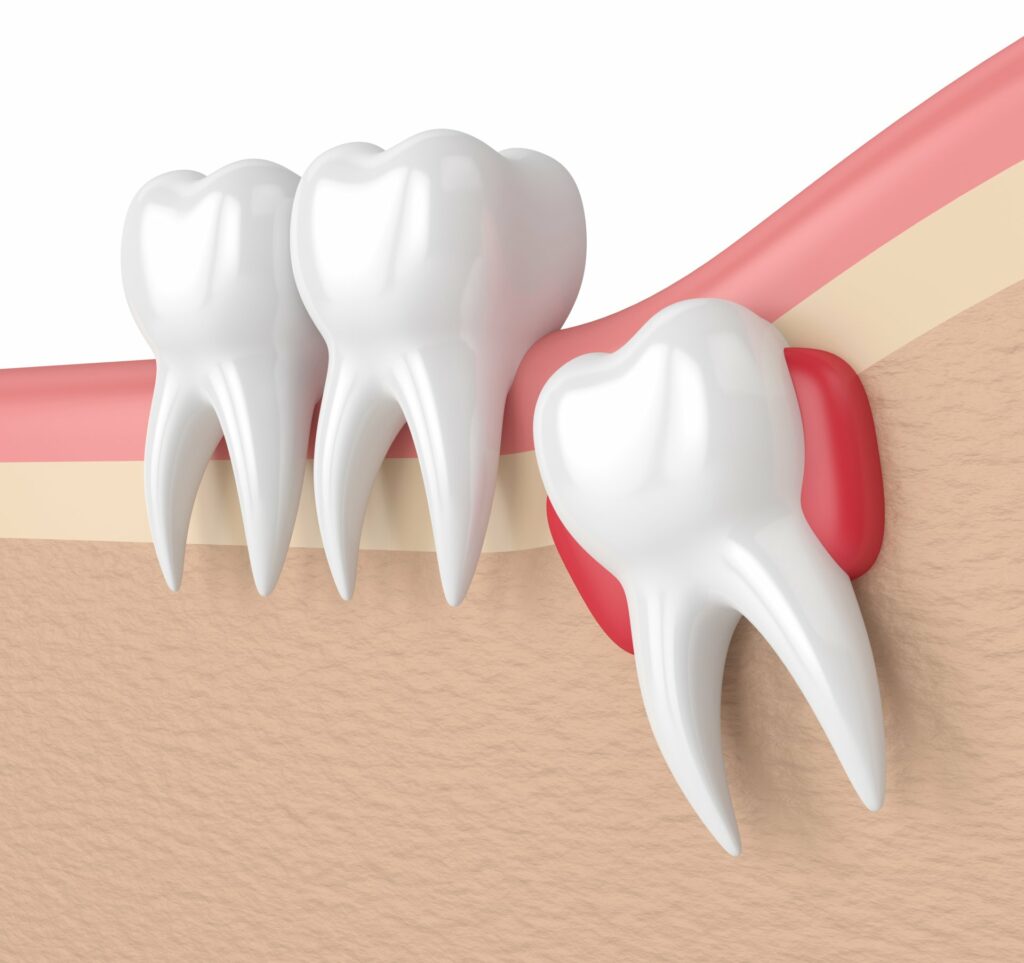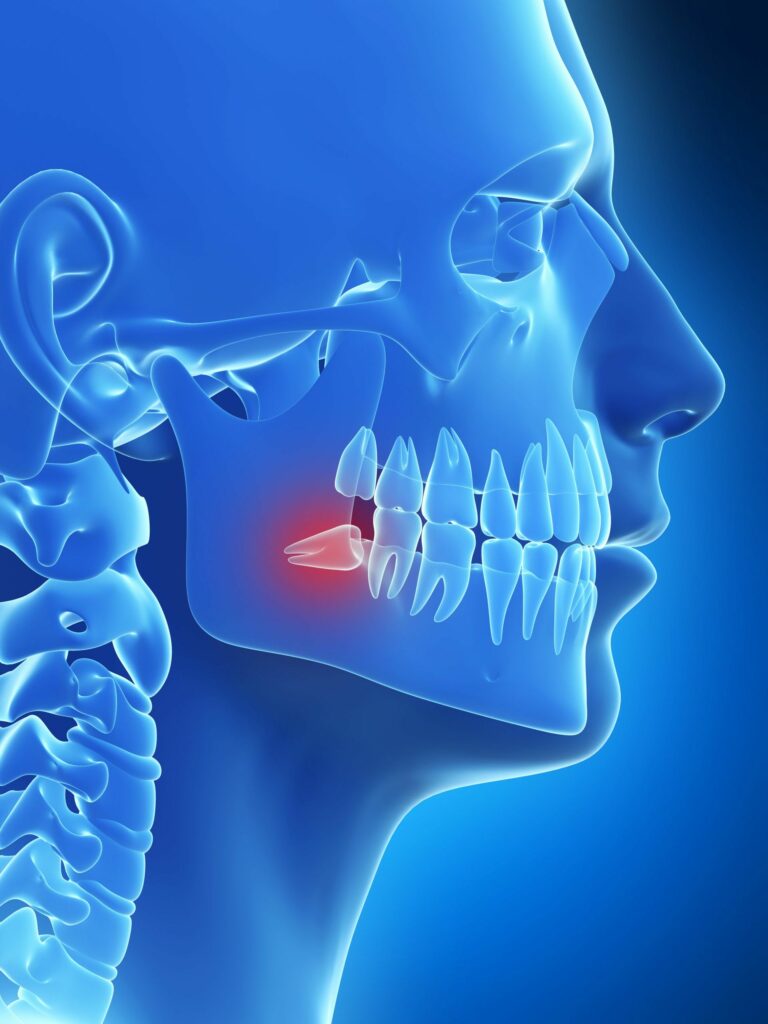WISDOM TOOTH EXTRACTION
Pre-Operative General Instructions
- Fill all prescribed medication at least 24 hours prior to surgery. If you have misplaced your prescriptions contact the office immediately. Please allow 24 hours for prescriptions to be called in to your pharmacy.
- Please remember to take your antibiotic 1 hour prior to surgery. Follow the instructions on the label. If you have any questions, please contact the office.
- Routine medications can be taken, but please confirm this with the doctor prior to your surgery day. If you are taking medications, please bring the prescription bottles with you.
- If your health changes or your develop a cold, flu, or any other ailment during the week before surgery, please notify us immediately.
- Please do not wear contact lenses, make up or nail polish on the day of surgery. Wear loose fitting clothes, short sleeve shirt with an open neck.
- Please notify us immediately if you suspect that you are pregnant
- Consult with your medication specialist for more instructions. Click here for medication instructions.

Pre-Operative Instructions for IV and Oral Sedation
- For IV Sedation Patients ONLY: Please DO NOT eat or drink anything, not even water, 6 hours before your scheduled surgery time. You may take your prescribed antibiotics with up to ½ glass of water.
- For Oral Sedation Patients ONLY: Please bring the prescribed sedative in the prescription bottle. DO NOT take the medication until instructed by the clinical staff.
- You must have someone drive you to and from the office. Please have your driver remain in the office while you are undergoing treatment.
- Your judgment and reflexes may be impaired following sedation or anesthetic. Although you may feel fully alert, you should not operate a vehicle, power tools, or any machinery for 24 hours following your procedure.
- Make arrangements for an adult to be present with you the remainder of the day.
SURGICAL INSTRUCTIONS: AFTER WIDSOM TOOTH REMOVAL
Unnecessary pain and the complications of infection and swelling can be minimized if the instructions are followed carefully.
Immediately Following Surgery
- The gauze pad placed over the surgical area should be kept in place for a half hour. After this time, the gauze pad should be removed and replaced with a new moist gauze pad, if there is any bleeding.
- There will be a hole where the tooth was removed. The hole will gradually fill in with new tissue over the next month. In the meantime, the area should be kept clean especially after meals with salt-water rinses or a toothbrush.
- Vigorous mouth rinsing or touching the wound area following surgery should be avoided. This may initiate bleeding by causing the blood clot that has formed to become dislodged.
- Before the local anesthetic subsides (about 60 minutes), take the pain medication prescribed as directed along with Motrin (they work well together). The prescribed pain medicine will make you groggy and will slow down your reflexes. Do not drive an automobile or work around heavy machinery. Avoid alcoholic beverages.
- Place ice packs to the sides of your face where surgery was performed. Refer to the section on Swelling for an explanation.
CAUTION: If you suddenly sit up or stand from a lying position, you may become dizzy. If you are lying down following surgery, make sure you sit for one minute before standing.

Bleeding
A certain amount of bleeding is to be expected following surgery. Slight bleeding, oozing, or redness in the saliva is not uncommon. Excessive bleeding may be controlled by, placing a moist gauze pad over the area and biting firmly for 30 minutes. Repeat if necessary. If bleeding continues, bite on a moistened tea bag for 30 minutes. The tannic acid in the tea bag helps to form a clot by contracting bleeding vessels. To minimize further bleeding, do not become excited, sit upright, and avoid exercise. If bleeding does not subside, call for further instructions.
Swelling
The swelling that is normally expected is usually proportional to the surgery involved. Swelling around the mouth, cheeks, eyes and sides of the face is not uncommon. This is the body’s normal reaction to surgery and eventual repair. The swelling will not become apparent until the day following surgery and will not reach its maximum until two to three days post-operatively. However, the swelling may be minimized by the immediate use of ice packs. Two plastic bags filled with ice, or ice packs should be applied to the sides of the face where surgery was performed. The ice packs should be left on continuously while you are awake. After 24 hours, ice has no beneficial effect. If swelling or jaw stiffness has persisted for several days, there is no cause for alarm. This is a normal reaction to surgery. Twenty-four hours following surgery, the application of moist heat to the sides of the face is beneficial in reducing the size of the swelling. If your post-operative swelling worsens on post-operative day 4-5 or unusual symptoms occur, call the office for instructions.
Diet
Drink cold liquids after procedure. Do not use straws when drinking from a glass. The sucking motion can cause more bleeding by dislodging the blood clot. You may eat anything soft by chewing away from the surgical site(s). High calorie, high protein intake is very important. Try to maintain a normal diet. You should prevent dehydration by taking fluids regularly. Your food intake will be limited for the first few days. You should compensate for this by increasing your fluid intake. At least five to six glasses of liquid should be taken daily. Try not to miss a single meal. You will feel better, have more strength, less discomfort, and heal faster if you continue to eat. Avoid eating hot temperature, acidic, and spicy foods.
Keep Your Mouth Clean
No rinsing of any kind should be performed until the day following surgery. You can brush your teeth the night of surgery but rinse gently. The day after surgery you should begin rinsing at least five to six times a day with a cup of warm water mixed with a teaspoon of salt especially after eating.
Discoloration/Bruising
In some cases, discoloration of the skin follows swelling. The development of black, blue, green, or yellow discoloration is due to blood spreading beneath the tissues. This is a normal post-operative occurrence, which may occur two to three days post-operatively. Moist heat applied to the area may speed up the removal of the discoloration. The use of Traumeel (see Traumeel sheet) will aid in reducing post-operative bruising and swelling.
Antibiotics
If you have been placed on antibiotics, take the tablets or liquid as directed. Antibiotics will help prevent infection. Discontinue antibiotic use in the event of a rash or other unfavorable reaction and call the office.
Nausea
Nausea and/or vomiting are not uncommon after surgery. Sometimes pain medications are the cause. Nausea can be reduced by preceding each pain pill with a small amount of soft food, and with a large volume of water. You can also sip on Coke, tea, or ginger ale.
Activity
Restrict your activities the day of surgery and resume normal activity when you feel comfortable. If you are involved in regular exercise, be aware that your normal nourishment intake is reduced. Exercise may weaken you. If you become light headed, stop exercising.
Smoking
Do not smoke for at least two weeks following surgery, if at all. As discussed at your consultation, smoking dramatically increases the risk of dry sockets.
Pain
For moderate pain, you may take 1 Motrin every three to four hours. If you are unable to take Ibuprofen then take one or two tablets of Tylenol or Extra Strength Tylenol every three to four hours. DO NOT exceed 4,000mg of Tylenol and 2,400mg of Motrin/Ibuprofen within a 24 hour period.
Please Note: Vicodin and other narcotics have Tylenol in them. Use the exact dosages when calculating your pain medication daily intake.
For severe pain, take the tablets prescribed as directed along with Motrin (they work well together). The prescribed pain medicine will make you groggy and will slow down your reflexes. Do not drive an automobile or work around machinery. Avoid alcoholic beverages. Pain or discomfort following surgery should subside more and more every day. If pain persists, it may require attention and you should call the office.
Other Concerns
- If numbness of the lip, chin, or tongue occurs there is no cause for alarm. As stated before surgery, this is usually temporary in nature. You should be aware that if your lip or tongue is numb, you could bite it and not feel the sensation. Be careful. Call our office if you have any questions.
- A slight elevation of temperature immediately following surgery is not uncommon. If the temperature persists, notify the office.
- Occasionally, patients may feel hard projections in the mouth with their tongue. They are not roots; they are the bony walls, which supported the tooth. These projections usually smooth out spontaneously. If not, they can be removed by the doctor.
- Sore throats and pain when swallowing are not uncommon. The muscles get swollen. This will subside in two to three days.
- Stiffness (trismus) of the jaw muscles may cause difficulty in opening your mouth for a few days following surgery. This is a normal post-operative event that will resolve in time.
- Sutures may be placed in the area of surgery to minimize post-operative bleeding and to help healing. Sometimes they become dislodged. This is no cause for alarm. Just remove the suture from your mouth and discard it. The sutures will dissolve anywhere between a few days and a week after surgery.
Your case is individual. No two mouths are alike. Do not accept well-intended advice from friends. Discuss your problems with Drs and staff of NSCOFS.

